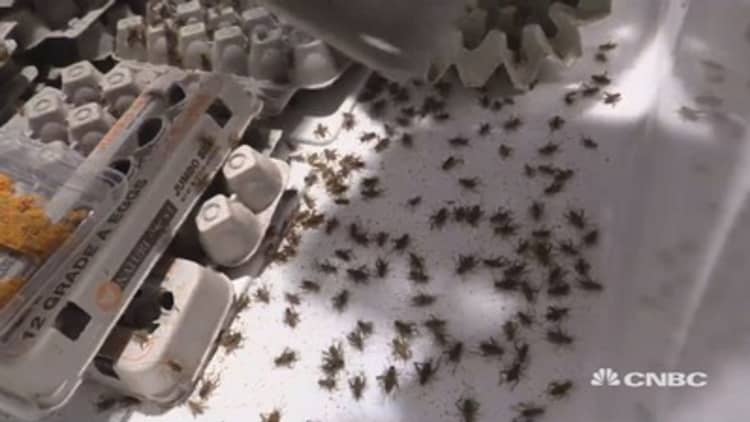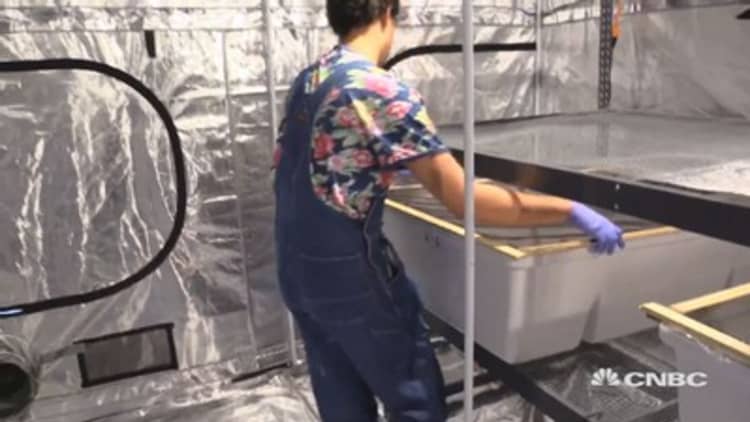
The next big superfood rich in protein may be crickets, or what bug farmer Elliot Mermel refers to as "micro livestock."
The edible cricket market is seen as growing substantially this year, with some of the players forecasting triple-digit sales growth. (Tweet This.) And some of the nation's largest natural and organic food chains are leading the chirping charge by featuring bug-based products on their store shelves.
Sprouts Farmers Market will introduce cricket-based food to its more than 200 stores next month with the launch of Chapul cricket protein bars. Whole Foods Market currently sells Exo bars made from cricket "flour" at some of its New York City locations.
Read More
"Our customers are interested in exploring new products with higher protein levels, but some protein sources (whey, soy) can be difficult to digest or can cause other side effects," Sprouts spokeswoman Donna Egan told CNBC.

Mermel recently launched Coalo Valley Farms—California's first edible cricket farm. He raised $100,000 from family members and hopes to generate another $30,000 to $40,000 from a Kickstarter campaign that it expects to launch on Monday.
"We saw an awesome opportunity where we could take such an old industry and such an old form of nutrition—insects—and kind of put a new-world, a new-generation twist on it," said Mermel, who runs his farm out of a 7,000-square-foot warehouse in the Los Angeles suburb of Van Nuys. He plans to initially sell cricket flour to restaurants and other businesses and wants to eventually add other cricket-based products for the consumer market.
Crickets at Coalo Valley Farms are fed a produce-based diet of fruit and vegetable fiber waste. Mermel said the diet produces cricket flour with a "nutty" flavor similar to almonds.
The Food and Drug Administration has jurisdiction over insects that can be used for food, including food additives such as cricket flour.
Read More
Portland, Oregon-based Cricket Flours started selling flour last November, and founder and CEO Charles Wilson said the company is "growing month over month." But he added, "there's still that educational hurdle where people might not know that they want to eat crickets or know that it's an option."
Mark Cuban of "Shark Tank" invested in Chapul last year and now holds a 15 percent stake in the Salt Lake City-based company, according to Pat Crowley, Chapul's founder and primary owner.
Exo, the cricket bar company, also has generated investor interest. Last year, Exo raised $1.2 million from an investor group. Additionally, the New York-based company had a Kickstarter campaign in 2013 that raised nearly $55,000.
Cricket bars are not cheap. They usually retail for more than $3 each. Some bars have added favoring such as chocolate, peanut butter, coffee or coconut. Each bar contains 40 to 70 crickets. A pound of cricket flour requires about 5,000 crickets.
Crowley forecasts Chapul's current-year sales will rise 400 to 500 percent. That follows 2014 sales growth of "over 500 percent." He added, "We'll hit a million dollars in sales this year."
Read MoreRestaurant to give 'White Appreciation Day' discount
Greg Sewitz, co-founder and co-CEO of Exo, wouldn't divulge financial details but said it's been a challenge keeping up with demand for the cricket protein bars.
"Sales seem to just keep on rising and accelerating," he said. "We've been selling out of bars every time we do a new run—and we doubled the size of the run thinking it would be enough, and then it's not."
According to Sewitz, the biggest hurdle facing the industry is "to get enough high-quality crickets. The farms themselves are all fairly new, and they don't want to scale up too quickly and sort of do things the wrong way or risk putting their existing business on the line."
Disclosure: CNBC owns the exclusive off-network cable rights to "Shark Tank."


